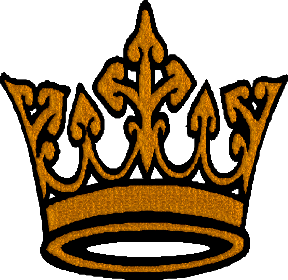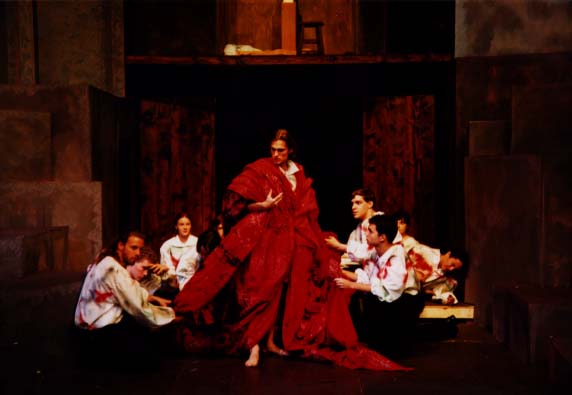
Romeo and Juliet Scrapbook: Prince Escalus
The following project was assigned in 9th grade, English 9. The assignment was to create a scrapbook for a character from Romeo and Juliet, and we were given a list of what to include. The list included a bio poem, a character sketch, five journal entries, a friendly letter, a newspaper article, and ten lines of paraphrasing. This project recieved an 'A'. |
Romeo and
Juliet:

Prince Escalus
By: Heather Davis
Table of
Contents
Romeo & Juliet
Scrapbook
Prince Escalus
I - Bio Poem
II - Character Sketch
III - VII - Journal Entries
VIII - Friendly Letter
IX - Newspaper Article
X - Paraphrasing
The Bio of
Prince Escalus
Prince
Ruler, Noble, Judge
Royal, Peaceful, Strict
Kinsman to Mercutio
Who feels Verona must be
safe, that the families mustn't fight, and who does must then die.
Who would like the families at peace, the streets left un-stained
with blood, and his family left out.
Resident of Verona,
Escalus
Page I
Character
Sketch

He stands a majestic six foot three, tall for a
man of his ancient time. Long, auburn hair cascades over his
shoulder and down his back to end midway. His eyes are two round
sapphires peeking out at you from his youthful, handsome face. A
certain aura proclaims this figure to be a royal man - a prince.
Various articles of his wear bare the crest of a great and
ancient city. His voice is that of a young male, no older than
twenty-five. However, he speaks with a commanding vigour, and his
distinctive ancient Italian accent announces within itself that
he must be none other than the Prince of Verona - Prince Escalus.
Robed in a bright crimson red cloak, this man is at a constant
battle to keep the streets of his city safe from the two rivaling
houses of the Capulets and the Montagues. His beliefs want
nothing more from his people than peace. He bestows great love
for his family, and stands very protective of his kinsmen
Mercutio and Paris. He would be saddened to great extends should
something happen to either of them. However, he is also quite a
strict ruler. To keep his town safe, he vows death to any that
should disturb the constant shattered peace of Verona. At heart,
he has no will to harm any, but he is determined to do as he must.
It is his judgement that determines much of the fate that Verona
should ever come to. His decisions mark every bit of business
that should come of it. However, should he become ignorant of a
conflict, the conflict will not cease. He may very well become
intertwined in it's thorns and could end up caught in his own
punishment.
Page II
June 3rd, 1602 (Evening)
Ah, a day of vexation, marry. Again, the two rival houses of the
Capulets and the Montagues have been quarreling in the streets of
Verona. Alack, I fear t'will never end. I fear another to be
anon, e'en after I warn them with death, shall it happen again. I
tire of the need to hie out to stop a fight every time one should
start. I would that it'd end.
Prince Escalus, June 3, 1602
Page III
June 4th, 1602 (Morning)
Alack! A frightful nightmare hath been bestowed upon my cluttered
mind. I dream of conflict, struggle, and loss. Overcome by this,
fear grows within in me! Some fateful reasoning beyond my
comprehension hath granted me this undying worry for my dear
kinsman, Mercutio. My day shall not go easy amidst such dreadful
thoughts, methinks.
Prince Escalus, June 4, 1602
Page IV
June 5th, 1602 (Midday)
Strange dreams. Angry thoughts still arise within me! Revenge is
all that rests in my sleepless head as now my dreams of two
nights have come true! Aye, I burn in anger, marry, for another
fight hath broken. That Capulet dog, Tybalt hath slain Mercutio,
and hadth Romeo not shed the rotted blood of Tybalt for the loss
of his mate, surely I myself wouldst have for the death of my
kindred! Dost Capulet believe I could honestly grant death to
Romeo who hath granted what I would? But the Capulet house would
him dead, and so to protect Romeo, I've banished him hence. The
Montague house writes to me in fear, that should Romeo return,
they plea I not shed his blood. Nay! I could not do such,
howe'er, the Capulets wilt with ease, and so stands my reason for
his banishment. In truth be set.
Prince Escalus, June 5, 1602
Page V
June 6th, 1602 (Morning)
I fear dearly for my own health. Nights have passed more vivid
dreams than those come true. Dreams of diabolical darkness and
death. Banshees scream and ravens glare. Deep shadows, abyss, and
death all come forth to haunt me. Howe'er, 'tis my kinsman Paris
this time, who liest in a crimson pool. Beside him, the lifeless
bodies of fair Juliet of the Capulet, and Romeo of the Montague.
Alack, shall such dreams be as true as the last, my heart shall
harden to become a brittle glass and shatter, shredding my
insides. I gain no slumber with such loathsome dreams.
Prince Escalus, June 8, 1602
Page VI
June 8th (Evening)
I write these words more in my sweat and blood than ink. I dream
of peace, but not for the better. Death! Death hath been bestowed
on the trio of my dream. Paris, Juliet, and Romeo art all dead!
Nay! It cannot be true methinks, but all the more it is! It hath
taken the death of Paris for Romeo to be with Juliet, and Romeo
poisoning himself o'er the death of Juliet who hath not truly
been dead! So alas, Juliet awakens to the dead Romeo and stabs
herself o'er his body! Friar Lawrence hath provided me with such
detail which hath been confirmed by other sources. For all of
this, dies Lady Montague in a deepened sadness, much like the one
I find myself in. Yet because of these two houses, all including
I must suffer. Were I without sense, I'd burn both houses and all
involved! Howe'er, enough have died o'er them. I will rest a few
days whilst the families tribute the child of each other in gold
and final peace is brought. But I've yet to determine who shall
be punished. I starve to shed blood in this anger, but only when
I may make figure of who is truly to blame. Rest assured,
howe'er, there will be punishment for this loss.
Prince Escalus, June 8, 1602
Page VII
333 Bloodshed Ave.
Verona, Italy 71632
June 5, 1602
Dear Prince Escalus,
I beg of thee, that should our Romeo return to Verona anon, canst
thou haply consider sparing his dear life? Aye, 'tis true that he
hath slain Tybalt, but hath Tybalt not been a murderer, himself?
A murder to thine own kinsmen! We would that thou wouldst allow
him back.
Methinks the Capulets seeketh revenge on our Romeo. To torture or
further banish him? Nay! To grant him a horrid death he hath not
deserved! For I have heard of such wretched plan issued by the
loathsome Lord and Lady Capulet, myself, that they should send
hence a person or many to slay our poor Romeo once and for all.
We wish to bring him hither, whence we shall then hide him until
the Capulets give up on his death, or by such strange occurrence
come at peace with us. Howe'er, we shall give to thee our
promise, that should our Romeo return safely, we will try best to
come at peace with the vengeful Capulets. Thou art a good man,
but so is Romeo. Spare his life for us, dear Prince, and our
gratefulness should exceed any that hath been before. Withal, I
fear for m'lady's health in her bitter sorrow as I do Romeo's in
his banishment. We know of thine's forgiving heart and beg of
thee this favour.
Lord Montague
Page VIII
The Verona Adventurer
Prince Escalus: To Pardon or Punish?
| Prince
Escalus, the honourable Prince of Verona made a great
speech yesterday after the discovery of the bodies of
Romeo Montague and Juliet Capulet, along with his own
kinsman, Paris. The prince became enraged after having
been notified of yet more deaths due to an endless
rivalry he had been meaning to end between the Montague
and Capulet houses. Friar Lawrence of Verona was live on the sight of the Prince's speech, where he confessed to a long involvement between the deceased couple. "Romeo, there dead, was husband to that Juliet; And she, there dead, that's Romeo's faithful wife. I married them." says the Friar. Summed up, he states that he gave Juliet a potion so she would not have to marry Paris, but the potion also made her love, Romeo believe she was dead. To this, he kills himself, and when she awakens so does she. Also at the scene of the crime was a servant of Paris. "He came with flowers to strew his lady's grave; And bid me stand aloof, and so I did. Anon comes one with light to ope the tomb; And by and by my master drew on him; And then I ran away to call the watch." says the servant of Paris to the Prince. |
Translated,
Paris was visiting Juliet's grave and asked his servant
to watch. Another man soon thereafter arrived at the
tomb, and fought Paris. This is when the servant left to
retrieve the watch. The coronor at this time states that
it was Romeo who shed the blood of Paris. Prince Escalus, after reading the letter given to him by a young Montague servant, Balthasar, stated his own loss of kindred because of his ignorance of the matter. After the Capulet and Montague house forgave each other and dedicated a statue of each other's child to one another, Escalus sent them away to talk of the matter. He stated that some would be forgiven, but others punished. The prince was quoted, "Never was a story of more woe than this of Juliet and her Romeo." There is no word at this time of who the Prince of Verona wishes to pardon or punish. |
Page IX
Paraphrasing
This letter proves the claim of Friar Lawrence true.
Romeo and Juliet were in love, and so because of these events she
is dead.
Romeo writes about his purchase of a poison,
Which he bought from a poor apothecary, so..
He went to the vault to quaff the poison and die where Juliet had.
So, where are these rivals, Montague and Capulet?
Do you see what has happened because of your hatred?
Fate and love have killed your children!
And because I have let you go,
I have lost two family members of my own! All have paid.
- Prince Escalus, Romeo and Juliet
- Act V, Scene III, Lines 285 - 294
Page X